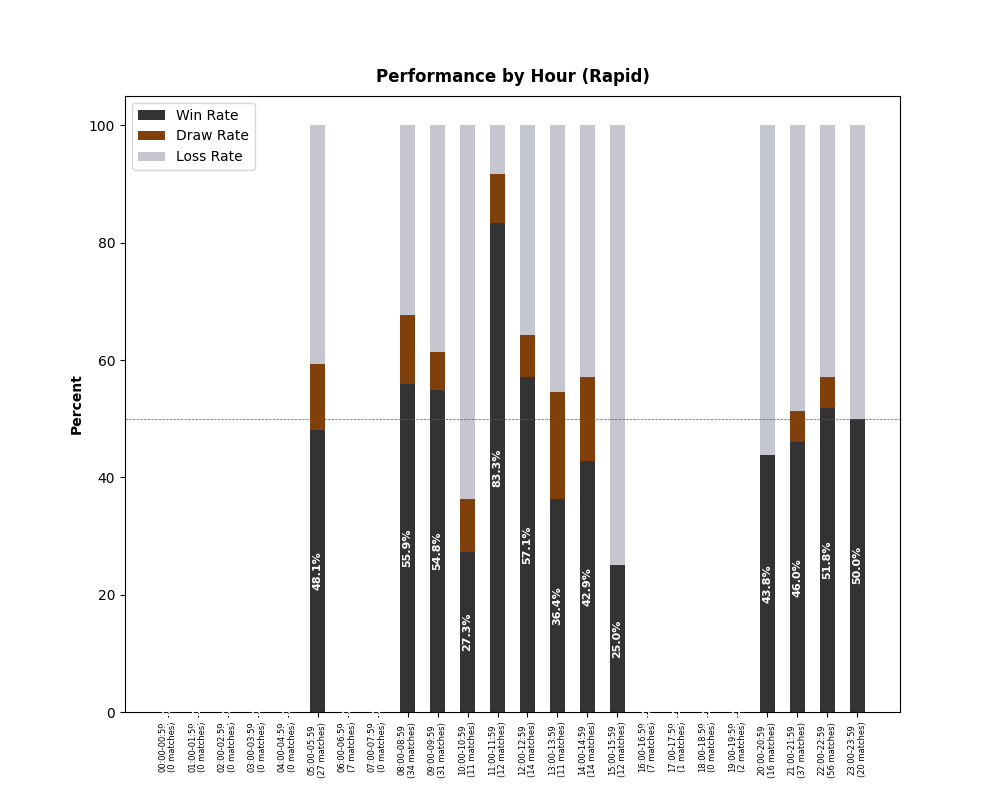Chess. When do I play my best?
Using Python to determine my online chess win-draw-loss record for each hour of the day. And yours.
One in a series of projects highlighting my progress as a self-taught programmer.
I began teaching myself Python, SQL, and GIS in spring 2023 — starting from zero. I therefore welcome feedback on these projects and review for errors. And I’d be interested in taking a crack at your own data and geospatial questions too. Please get in touch.
5 July 2023
Background
Chess.com may claim over 100 million users, but for a clean, ad- and gimmick-free interface, and for the most flexible tools and powerful match analysis, many chess players turn to Lichess.org, a free, open-source non-profit platform created by French programmer Thibault Duplessisrun.
The Lichess API and open database allow anyone to crunch the outcomes, moves, and parameters of nearly five billion rated games. Some 6,500 of those games are mine, and over the years I’ve always wondered: What time of day do I play my best chess?
To find out, I wrote a Python program that grabs match data for any Lichess username via the Lichess API, parses and cleans that data with chess, pandas, datetime, and other library modules, and graphs hour-by-hour results with numpy and matplotlib. I defined a function—hourly_performance(tf)—to perform the filtering and calculations needed to create the lists I fed into matplotlib, where ‘tf’ represents the “time formats” I wanted to investigate:
Bullet: Games with a 2+1 or tighter time control (meaning 2 minutes to play all moves, with 1 second added as each move is played)
Blitz: Games with a 5+3, 5+0, 3+2, or 3+0 time control
Rapid: Games with a 15+10, 10+5, or 10+0 time control
Overall: All games
As an early riser, did I perform better in the morning hours? Or lunch hour? Or late at night, after the kids were in bed?
Project outputs
Perhaps the most interesting chart from the analysis concerned Rapid matches, a comparatively longer time format that allows one to play strategically as opposed to reactively. My Lichess percentile ranking is highest here, and I care more about performance under longer time controls, especially compared to Bullet, where things can go south for any player very fast. As this chart suggests—and as I suspected—I appear to do well earlier in the day, especially between 8-10am, a period when, typically, I’m first sitting down at my desk after dropping my kids off at school or returning from the gym. Conversely, I struggle in the early afternoon and late at night.
The charts below for Blitz, Bullet, and Overall show more even, consistent results over the course of the day, though I still see a morning bump, when the mind is fresh, including with my first, 5am Blitz and Bullet matches of the day.
(Click to enlarge charts)
Techniques
For coding, I needed ChatGPT’s assistance to get several elements of my program right, not least the matplotlib charts themselves, as this was my first time employing the tool. The chess library was critical in reading the pgn (portable game notation) file commonly used to record game data and creating a list of dictionaries that was then converted into a pandas dataframe.
Dataframe in hand, I spent fifteen lines of code dealing solely with time. Assigning each match an ET (Eastern Time) time zone required string-splitting UTC dates and times, converting to datetime objects, and additional time zone localization steps and new columns.
As mentioned above, my program’s hourly_performance(tf) function took care of the rest, finding wins, losses, and draws by filtering for time formats and outcomes, and len-counting rows in a for hour in range (24): for loop.
Data sources
The Lichess API and database are at:
https://lichess.org/api
https://database.lichess.org
The latter lists a couple dozen projects derived from Lichess data. Among my favorites are Antiochian’s “Does the low time alarm make people play worse?” and the World Chess Champion Number, where I discovered I beat someone who beat someone who beat someone who beat five-time world champion Magnus Carlsen (giving me a World Chess Champion number of 4).

